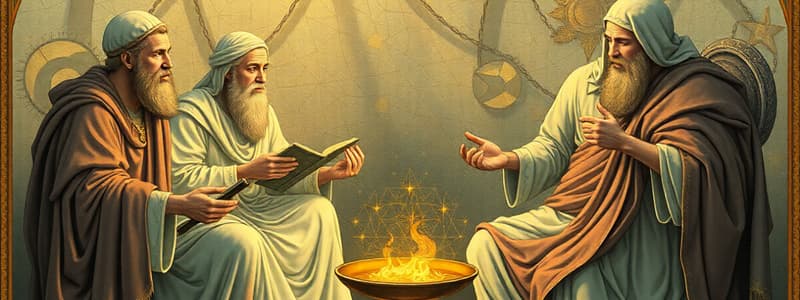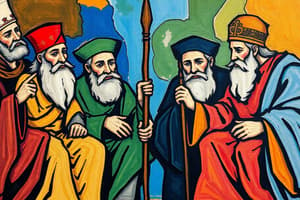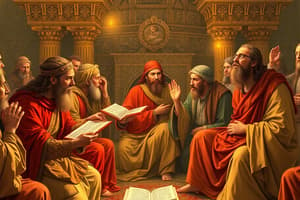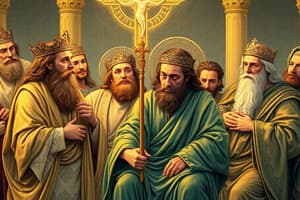Podcast
Questions and Answers
Why did some Pharisees' emphasis on external religious observance sometimes lead to unintended negative consequences?
Why did some Pharisees' emphasis on external religious observance sometimes lead to unintended negative consequences?
- It encouraged humility and introspection, making them question their beliefs.
- It inadvertently fostered pride and self-righteousness as they flaunted their piety. (correct)
- It promoted strict adherence to Roman laws, causing conflict with Jewish traditions.
- It led to a deeper understanding of the scriptures, causing disagreements.
The Sadducees embraced the oral tradition and believed in the afterlife, aligning them closely with the beliefs of the common people.
The Sadducees embraced the oral tradition and believed in the afterlife, aligning them closely with the beliefs of the common people.
False (B)
What was the primary point of contention between Jesus and the Pharisees that ultimately led to them becoming his 'bitter antagonists'?
What was the primary point of contention between Jesus and the Pharisees that ultimately led to them becoming his 'bitter antagonists'?
Jesus's dismissal of religious formalism and externalism, together with his claim of authority to teach independent of their approval.
Unlike the Pharisees, the ___________ favored cooperation and accommodation with the Roman occupation, a stance that reflected their ties to the Jerusalem elite.
Unlike the Pharisees, the ___________ favored cooperation and accommodation with the Roman occupation, a stance that reflected their ties to the Jerusalem elite.
Match the following groups with their distinct characteristics:
Match the following groups with their distinct characteristics:
Why did Herod Antipas ultimately order the execution of John the Baptist?
Why did Herod Antipas ultimately order the execution of John the Baptist?
Jesus expressed disappointment and anger towards towns in Galilee because they largely rejected his and John's messages.
Jesus expressed disappointment and anger towards towns in Galilee because they largely rejected his and John's messages.
According to Jesus, what comparison did people make about him and John the Baptist regarding their lifestyles?
According to Jesus, what comparison did people make about him and John the Baptist regarding their lifestyles?
Herod Antipas hesitated to execute John the Baptist because he had shown a surprising ______ in John, even visiting him in prison.
Herod Antipas hesitated to execute John the Baptist because he had shown a surprising ______ in John, even visiting him in prison.
Match each figure with their role or action in the narrative:
Match each figure with their role or action in the narrative:
Why were the chief priests and Pharisees dismayed?
Why were the chief priests and Pharisees dismayed?
Jesus explicitly quoted Mosaic law when addressing the woman caught in adultery.
Jesus explicitly quoted Mosaic law when addressing the woman caught in adultery.
What was Jesus's initial response when the woman caught in adultery was brought before him?
What was Jesus's initial response when the woman caught in adultery was brought before him?
Jesus responded to the accusation of having a demon by stating, 'I have not a demon, but I ________ my Father and you dishonor me'.
Jesus responded to the accusation of having a demon by stating, 'I have not a demon, but I ________ my Father and you dishonor me'.
Match the statements made to or about Jesus with their implications:
Match the statements made to or about Jesus with their implications:
Why is the number twelve significant in the selection of Jesus's apostles?
Why is the number twelve significant in the selection of Jesus's apostles?
Jesus chose his twelve apostles before beginning his public ministry.
Jesus chose his twelve apostles before beginning his public ministry.
Besides proclaiming the coming of God's kingdom, what was the other great purpose of Jesus's ministry?
Besides proclaiming the coming of God's kingdom, what was the other great purpose of Jesus's ministry?
Jesus appointed twelve apostles, also known as _______, to be pillars of the faith community.
Jesus appointed twelve apostles, also known as _______, to be pillars of the faith community.
Match the apostle to the description:
Match the apostle to the description:
Flashcards
Who were the Pharisees?
Who were the Pharisees?
A Jewish group known for strict adherence to religious details and oral traditions.
What practices of the Pharisees did Jesus criticize?
What practices of the Pharisees did Jesus criticize?
Religious formalism and pride
Who were the Sadducees?
Who were the Sadducees?
Jewish traditionalists who only accepted the Pentateuch as authoritative and denied the afterlife.
Where did the Sadducees have significant influence?
Where did the Sadducees have significant influence?
Signup and view all the flashcards
Why did Pharisees and Sadducees both oppose Jesus?
Why did Pharisees and Sadducees both oppose Jesus?
Signup and view all the flashcards
The Adulterous Woman
The Adulterous Woman
Signup and view all the flashcards
Jesus' Challenge
Jesus' Challenge
Signup and view all the flashcards
Jesus' Mercy
Jesus' Mercy
Signup and view all the flashcards
Claim of Divinity
Claim of Divinity
Signup and view all the flashcards
"Before Abraham, I AM"
"Before Abraham, I AM"
Signup and view all the flashcards
Jesus' primary purpose
Jesus' primary purpose
Signup and view all the flashcards
Jesus' secondary purpose
Jesus' secondary purpose
Signup and view all the flashcards
Jesus' feelings for the people
Jesus' feelings for the people
Signup and view all the flashcards
The role of the apostles
The role of the apostles
Signup and view all the flashcards
Names of the 12 Apostles
Names of the 12 Apostles
Signup and view all the flashcards
Who was John the Baptist?
Who was John the Baptist?
Signup and view all the flashcards
Who rejected John and Jesus?
Who rejected John and Jesus?
Signup and view all the flashcards
Who executed John the Baptist?
Who executed John the Baptist?
Signup and view all the flashcards
What Sabbath controversy arose?
What Sabbath controversy arose?
Signup and view all the flashcards
What are Chorazin and Bethsaida?
What are Chorazin and Bethsaida?
Signup and view all the flashcards
Study Notes
Apostles and Opponents
- The Pharisees began to shout abuse, unwilling to accept that the man was not from God, stating that someone from God could not open the eyes of a man born blind
- The Pharisees demanded to know how a man born in utter sin could teach them, and subsequently threw the man out.
- Jesus sought out the healed man and asked if he believed in the Son of Man.
- The man asked who the Son of Man was so that he may believe in him.
- Jesus told him that it was he who speaks to him, and the man, falling to his knees, worshipped him.
- Jesus commented that he came into the world for judgment, so that those who do not see may see, and those who do see may become blind.
- Some Pharisees took offense and asked if they were also blind
- Jesus replied that if they were blind, they would have no guilt, but as they claim to see, their guilt remains.
A Man Born Blind
- A man blind from birth begged on the street, generally ignored, but occasionally receiving a coin.
- Jesus stopped, regarding him with pity, and the disciples asked who was responsible for his blindness.
- Jesus replied that neither the man nor his parents had sinned.
- Jesus spat on the ground, made paste, anointed the man's eyes, and told him to wash in the pool of Siloam in the southern district of the city.
- The man washed and returned, now seeing
- Those that knew him rushed him to the Pharisees for questioning on the Sabbath.
- The Pharisees stated that Jesus was not from God due to breaking the Sabbath, then commanded the man to give his opinion on Jesus.
- The man replied he was a prophet.
- Unwilling to believe the miracle, the Pharisees summoned the man's parents, who, fearing expulsion from the synagogue, stated that he was old enough to ask himself.
- The Pharisees summoned the man a second time, insisting that he describe what Jesus had done.
- "I have told you already," the man replied, asking if they wanted to become disciples.
The Battle lines are Drawn
- People brought Jesus a man who was mute, blind, and possessed by an evil spirit, and Jesus healed the man
- Onlookers asked if Jesus could be the Son of David, but the Pharisees sneered that he only cast out demons by Beelzebul, the prince of demons.
- Jesus calmly stated that he cast out demons by the Spirit of God and that to say otherwise was blasphemy.
- Whoever speaks a word against the Son of Man will be forgiven, but whoever speaks against the Holy Spirit will not be forgiven, either in this age or in the age to come.
- The battle lines had been drawn between Jesus as an agent of Beelzebul and the Pharisees as blasphemers of the Holy Spirit
- The Synoptic Gospels of Matthew, Mark, and Luke inform that Jesus stayed in Galilee without visiting Jerusalem during his ministry, but John's Gospel states that Jewish men were to visit Jerusalem three times yearly for the so-called pilgrimage feasts, including Passover, the Feast of Weeks, and the Feast of Tabernacles.
- Jesus, faithful to the traditions of his people, acted accordingly, using these visits to the Holy City as fresh opportunities to proclaim the Kingdom to pilgrims and the people of Jerusalem, while also engaging members of Jerusalem's religious establishment in discussion and debate.
- John's account of events occurred at the time of one Feast of Tabernacles.
- During this eight-day festival in the late harvest season, the small huts or tents – "tabernacles" – of pilgrims dotted the hillsides beyond the city walls, with the visitors coming to the Temple for religious ceremonies.
- Jesus preached and teached, which moved listeners to question if he wasn't the man whom they seek to kill.
Apostles and Opponents - Pharisees and Sadducees
- Some Pharisees made a fetish of external adherence.
- This emphasis on external religiosity fostered feelings of pride and self righteousness, with Pharisees often flaunting their piety for admiration.
- Jesus' dismissal of religious formalism angered the Pharisees.
- Jesus' insistence that he had authority to do and teach as he did without permission was an affront to the Pharisees.
- The Pharisees became Jesus' bitter antagonists, who aimed to eliminate them and preserve what they believed to be "true faith."
- The Sadducees were Jewish traditionalists who only recognized the Pentateuch (the first five books of the Old Testament) as fully authoritative.
- The Sadducees rejected oral tradition, denied the afterlife, and denied the existence of angels and spirits.
- Most Jewish priests were Sadducees, and they held a presence in the Temple.
- Pharisees were popular amongst commoners.
- Sadducees were well-connected and wealthy members of the Jerusalem elite.
- On the burning political issue of the day, The Pharisees avoided contact with the Romans, while the Sadducees stood for cooperation and accommodation
- The Gospels rarely mentioned the Sadducees by name, but Sadducees and Pharisees both sought Jesus' death.
- Although they agreed on little else, both Sadducees and Pharisees agreed on eliminating Jesus as a blasphemer and a threat
Apostles and Opponents
- John was a prophet on the model of Elijah and was a man sent by God and Jesus was the Messiah, yet many refused to believe.
- Many refused to believe and resembled the people that were mocked in a children's song, as it claimed that John came neither eating or drinking, and the people said that "He has a demon".
- Jesus, eating and drinking, was considered a friend of tax collectors and sinners.
- Expressing righteous anger, Jesus called out the towns of Galilee: "Woe to you, Chorazin! Woe to you Bethsaida! And you, Capernaum, will you be exalted to heaven? It shall be more tolerable on the day of judgment for the land of Sodom than for you.”
- Shortly after these events, Herod Antipas had John the Baptist executed.
- Herodias, the daughter of Herod hosted a banquet where she danced for the entertainment of Herod's guests.
- To impress his guests, Herod promised Herodias anything she wanted. She consulted Herodias, who told her to ask for the Baptist’s head.
- Herod hesitated as he had shown a surprising interest in John and liked to hear what John had to say. Afraid of looking foolish, Herod gave in and John was no more.
- Like storm clouds over the Sea of Galilee, signs of danger had begun to converge on Jesus as growing hostility of his enemies was apparent.
- Some Pharisees had seen his disciples plucking heads of ripe grain in the fields and eating them.
Apostles and Opponents
- Throughout his ministry, Jesus had two great purposes in view. One was to proclaim the coming of God’s kingdom and lead people into it. The other was to form a small group of chosen men who would continue his work after his death.
- Traveling about Galilee, preaching in synagogues, healing the sick, and expelling demons, Jesus felt compassion for the people who came to hear and see him.
- Jesus felt that the harvest was plentiful, but the laborers were few, so he told his followers to take steps to remedy that.
- After a night spent in prayer, he summoned the disciples and chose twelve to be his apostles which means "messengers" and pillars of the faith community that he would leave behind him
- The number twelve recalls the twelve tribes of Israel. The twelve men chosen were:
- Simon, now called Peter
- Andrew
- James, son of Zebedee
- John
- Philip
- Bartholomew
- Thomas
- Thaddaeus
- James, son of Alphaeus
- Matthew
- Simon the Zealot
- Judas Iscariot
Apostles and Opponents
- The authorities seemingly know that Jesus is the Christ.
- Dismayed and angry, the chief priests and Pharisees sent Temple guards to arrest Jesus, but he easily evaded them.
- On the last day of the feast, Jesus was far from the Temple on the Mount of Olives.
- The Pharisees dragged a woman who’d been caught in adultery before Jesus and demanded she receive death by stoning, according to Mosaic law.
- Jesus knelt down and silently wrote on the ground with his finger while the accusers persisted.
- Jesus told the crowd that whoever was without sin should be the first to throw a stone.
- One by one, from oldest to youngest, the accusers left, leaving the woman standing before Jesus.
- Jesus asked her if no one condemned her, then said that he didn't condemn her either and that she should go and sin no more.
- Jesus walked from the Mount of Olives to the Temple with his companions when the authorities questioned if their assertion that he was a Samaritan with a demon was not correct.
- Jesus denied having a demon, proclaiming that he honored his Father. He told his accusers that if they honored his word, they will never see death.
- Jesus was accused again of having a demon and questioned about whether he was greater than Abraham.
- Jesus replied that if he glorified himself, his glory is nothing.
- "If I glorify myself, my glory is nothing; it is my Father who glorifies me, of whom you say is your God."
- Jesus declared that Abraham saw the day that Jesus would come and was glad.
- Jesus' accusers questioned if Jesus had seen Abraham, as Jesus was not yet fifty years old.
Studying That Suits You
Use AI to generate personalized quizzes and flashcards to suit your learning preferences.
Description
Explore the distinctions between Pharisees and Sadducees, and Herod Antipas's interactions with John the Baptist. Understand the core conflicts between Jesus and the Pharisees and Sadducees. Learn about Herod Antipas's motivations behind the execution of John the Baptist.




